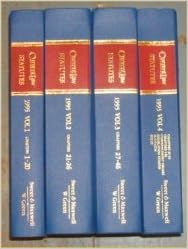


When using legislation you need to know information about:
There are a number of texts and services which help you check the status of legislation.
Several online database services incorporate features which allow you to check the status of UK and Scottish legislation.
However, it is sometimes necessary to use 'traditional', printed, aids.
From the provision record follow the link to ‘Provision Details’. Under ‘Commencement’ the date the section came into force is noted with details of relevant commencement provisions. If the provision is not in force this will be noted, for example, ‘Date to be appointed (not yet in force)’.
Commencement information for the entire act can be viewed by selecting ‘Act Details’ and then 'Commencement'.
N.B. Westlaw does not give complete commencement information for acts prior to 1991.
The default 'Primary & Secondary Legislation' search retrieves in force legislation. The version you see incorporates repeals (or revocations) and amendments.
Within the provision, text inserted by amending legislation is indicated by the text appearing within square brackets and repealed text is indicated by a series of dots in square brackets […]. Footnotes indicate the repealing/amending legislation.
Within the 'Provision Details', the ‘Table of Amendments’ allows you to view previous versions of the provision. Alternatively, select the version in the bar to the right of the text of the provision (e.g. Version 5) to view previous versions. Any version of a provision which has been amended is indicated as such with Superseded together with the dates the version was in force to the right of the text.
N.B. Detailed information is only available for amendments/repeals made in the period since information was uploaded to Westlaw (in 1991). However, amendments prior to that date are incorporated into in force legislation.
From the individual provision record, follow the link to ‘Provision Details’ (in the left frame). Under ‘Extent’ the territorial extent of the provision (e.g. UK, England & Wales, Scotland) is noted.
You can find out whether a provision has been judicially considered, interpreted, or otherwise cited in case law under 'Primary References' .
From the provision select 'Primary References'. Under ‘Key Cases Citing’ and 'All Cases Citing' you can see lists of any cases citing the legislation.
Tip: You can also find information about cases citing a legislative provision by using the Cases search and selection 'More options'. In the 'Legislation Title' enter the title of the act and then select the provision type (section, regulation etc.) from the 'Legislation Provision No.' dropdown and enter the number in the box.
Information about commencement is given, where possible, under the ‘NOTES’ section in each provision record.
Under 'Supporting Materials' to the right of the text of a provision, you can follow links to:
Each of these sources provides commencement information about provisions, where available.
A Legislation search retrieves in force legislation incorporating repeals and amendments (if you leave the 'Current Version' box checked in your search).
Repeals and amendments are indicated by the text appearing in square brackets.
Details of amending legislation are given, where possible, under ‘Notes’ within the provision record.
Under 'Supporting Materials' to the right of the text of a provision, you can follow the link to 'Halsbury's Statutes Citator' (or 'Halsbury's Annotations'_.
This source provides information about repeals and amendments, where available.
Under 'Supporting Materials' to the right of the text of a provision, you can follow a link to 'Cases' (if available). This source provides information about cases citing a provision, where available.

Please read the Additional Information before accessing this eResource.
Westlaw provides full-text access to a variety of legal information, including many UK cases, UK and Scottish legislation, a number of UK legal journals and EU materials. Westlaw's Journals search provides abstracts from articles from UK-published journals, including articles not available in full-text on Westlaw. Non-UK material is available by following the link to ‘Westlaw International’ from the homepage.
Users should sign in to this resource using University credentials. First time users (and users who have not accessed Westlaw in over 15 months) will also be prompted to register an account. Please follow our Westlaw Registration Instructions before accessing the resource for the first time.
Use your University of Strathclyde email address when registering. Users are not required to create a separate password for this resource.
Thomson Reuter's Privacy Policy and Cookies information can be viewed via links on the site.

Lexis+ UK Legal Research provides full-text access to legal, tax and accountancy information. This includes many U.K. reported and unreported cases, legislation, and a number of U.K. legal journals. Commentary includes the Stair Memorial Encyclopaedia and Halsbury’s Laws of England. In force legislation relating to England and Wales as well as that from the Scottish Parliament is included, but some pre-devolution U.K. legislation applying solely to Scotland is excluded. Material from non-U.K. jurisdictions is available under the ‘International’ tab. The service includes Tax and Accountancy content - sign in to Lexis+ UK and choose the 'Practice Area' tab, then select the Tax or Accounting options.

Legislation.gov.uk contains the official revised version of UK primary legislation including all in-force Public General Acts of the (now) UK Parliament, Acts of the pre-1707 Scottish Parliament and Acts of the devolved Scottish Parliament. At present there is a delay in revising legislation, but that which is awaiting revision should be noted as such. The service also provides access to unrevised versions of some SIs and SSIs and post-1991 UK Local Acts.
First look within the act itself for the ‘Commencement’ section (often designated 'Short title, commencement and extent') towards the end of the act, before any schedules. This may indicate that the act came into force on the day it received Royal Assent, or at a specified date thereafter. Alternatively, the commencement section may indicate that powers have been delegated to a minister to bring certain sections into force via a ‘Commencement Order’ (a type of SI).
If commencement powers are delegated, refer to either:
Or:
 Current Law Statutes
Current Law Statutes comprises annual "bound volumes” and the "Service File”.
Current Law Statutes
Current Law Statutes comprises annual "bound volumes” and the "Service File”.
Start with the volume covering the date of your act and trace forward in time. Find the act by year and chapter / asp number. (Pre-1707 Scots Acts and asps appear towards the front of each volume.)
The entry for each act lists, section by section, amending / repealing legislation issued during the period covered by each volume.
You need to look at the amending legislation to check exactly when, and how, the original legislation was amended.
N.B. The Legislation Citator only covers the period from 1948 onwards. For amendments and repeals prior to that date, refer to the Chronological Table of Statutes.
 Scottish Current Law Legislation Citator
These volumes enable you to track what has happened to legislation over the period covered by the citator - amendments, repeals, cases under various sections of an act.
Information is given about legislation created both prior to, and during, the period each volume covers – but only if amendments, repeals or relevant cases have occurred during that period
Scottish Current Law Legislation Citator
These volumes enable you to track what has happened to legislation over the period covered by the citator - amendments, repeals, cases under various sections of an act.
Information is given about legislation created both prior to, and during, the period each volume covers – but only if amendments, repeals or relevant cases have occurred during that period
 Scottish Current Law Statute Citator
These volumes enable you to track what has happened to legislation over the period covered by the citator - amendments, repeals, cases under various sections of an act.
Information is given about legislation created both prior to, and during, the period each volume covers – but only if amendments, repeals or relevant cases have occurred during that period.
Scottish Current Law Statute Citator
These volumes enable you to track what has happened to legislation over the period covered by the citator - amendments, repeals, cases under various sections of an act.
Information is given about legislation created both prior to, and during, the period each volume covers – but only if amendments, repeals or relevant cases have occurred during that period.
This table may be used to check for acts repealed /amended from 1235 up to the latest date covered by the table. Find the act by year and chapter / asp number. (Old Scots Acts and asps appear towards the end of the final part.)
The title of an act repealed in its entirety is in italics and the repealing legislation referred to.
The title of an act at least partially still in force is in bold and any repealed or amended provisions are referred to together with the amending legislation.
You will find this information in the act itself. The ‘extent’ section appears towards the end of the act before the schedules. This gives information about the territorial extent of sections within the act. For example:
129 Extent
(1) Subject to the following provisions, this Act extends to England and Wales only.
(2) Sections 83(2), 101 and 102 extend also to Scotland.
(3) The following provisions extend also to Scotland, Northern Ireland and Gibraltar—
(a) sections 103, 104 and 128,
(b) this section, and
(c) paragraph 7(2) of Schedule 7, and section 127(1) so far as relating thereto.
(4) Section 114 extends also—
(a) to Scotland,
(b) to Northern Ireland.
If a UK act contains no information about extent, it is presumed to apply to the whole UK.
Start with the volume covering the date of your act and trace forward in time. Find the act by year and chapter / asp number (pre-1707 Scots Acts and asps appear towards the front of each volume.)
The entry for each act lists notable cases which considered individual sections reported during the period covered by each volume.
 Scottish Current Law Legislation Citator
These volumes enable you to track what has happened to legislation over the period covered by the citator - amendments, repeals, cases under various sections of an act.
Information is given about legislation created both prior to, and during, the period each volume covers – but only if amendments, repeals or relevant cases have occurred during that period
Scottish Current Law Legislation Citator
These volumes enable you to track what has happened to legislation over the period covered by the citator - amendments, repeals, cases under various sections of an act.
Information is given about legislation created both prior to, and during, the period each volume covers – but only if amendments, repeals or relevant cases have occurred during that period
 Scottish Current Law Statute Citator
These volumes enable you to track what has happened to legislation over the period covered by the citator - amendments, repeals, cases under various sections of an act.
Information is given about legislation created both prior to, and during, the period each volume covers – but only if amendments, repeals or relevant cases have occurred during that period.
Scottish Current Law Statute Citator
These volumes enable you to track what has happened to legislation over the period covered by the citator - amendments, repeals, cases under various sections of an act.
Information is given about legislation created both prior to, and during, the period each volume covers – but only if amendments, repeals or relevant cases have occurred during that period.